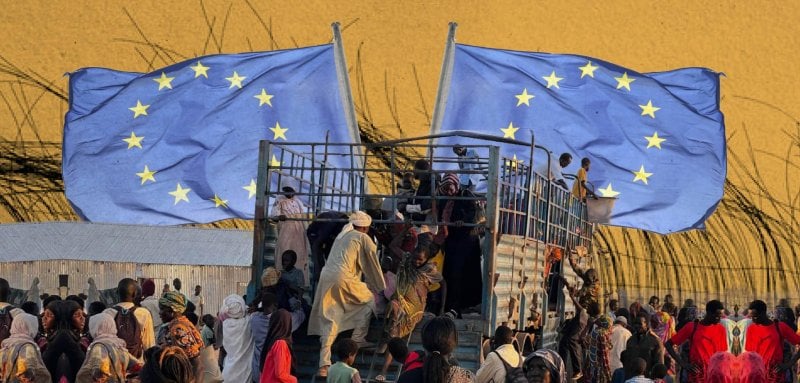Last week, the United States Department of State announced its support for the resumption of Sudan peace negotiations in Jeddah, Saudi Arabia in an effort to alleviate a severe humanitarian crisis and avert the escalation of the conflict into a regional war.
Seeing as April 15th also marks the one year anniversary of the onset of Sudan's conflict, it’s hard to ignore how the international community is, once again, abandoning the Sudanese people.
On Dec. 1, the United Nations Security Council said it would end its mission in the country, citing “disappointing” results despite the UN High Commissioner for Refugees calling for more funding to aid the humanitarian crisis.
Indeed, the mission — extended twice in 2021 and 2022 to support Sudan during its political transition to democracy after dictator Omar al-Bashir’s 2019 ousting — remains more pressing than ever.
Seeing as April 15th also marks the one year anniversary of the onset of Sudan's conflict, it’s hard to ignore how the international community is, once again, abandoning the Sudanese people.
Just look at the numbers: almost 8.5 million Sudanese are forcibly displaced with 6.5 million internally displaced and nearly 1.8 million seeking refuge outside of Sudan’s borders as result of the conflict. That’s on top of the previous 3.7 million internally displaced people and more than 800,000 people seeking refuge in other countries.
If the numbers are hard to digest, it’s because there are a staggering number of people with nowhere to go.
To remedy the looming influx of Sudanese refugees, the EU has pledged billions of Euros to Egypt, a supporter of the Sudanese Armed Forces (SAF), to “tackle the issue” following a series of shipwrecks that brought the deaths of hundreds of refugees off the coast of Europe. But there was no specification of how the EU’s money would be spent.
This isn’t the first time the international community has abdicated its responsibility toward Sudan, forcing the problem onto others. In 2014, nearly 30 European nations and 10 African states established the Khartoum Process, which sought to mitigate the surge of illegal African migration to Europe.
Good in theory, these partnerships — between overwhelmingly democratic nations in Europe and authoritarian regimes in Africa — have had unintended consequences, ultimately fueling human rights violations and making migrants even more vulnerable to abuse.
The Khartoum Process led to funds being pledged to Sudan’s regime, aimed at addressing the root causes of irregular migration and forced displacement and supporting vulnerable displaced populations. Ironically, the EU’s partner was al-Bashir, whom the International Criminal Court wants for alleged war crimes, crimes against humanity, and genocide in Darfur, a major contributor to the global forced migration crisis.
Al-Bashir also deployed the Rapid Support Forces (RSF), derived from the brutal Janjaweed militia that carried out the Darfur genocide, as border guards beginning in 2015. The RSF is engaged in Sudan’s current civil conflict against the SAF.
In September 2016, following an investigation revealing that the EU earmarked funds to train and equip Sudanese border police, the EU denied providing any direct financial support, even though the head of the RSF, Mohamed Hamdan, or “Hemedti,” publicly admitted to benefiting from EU funding.
Amid the 2019 Sudanese revolution and protests against Al-Bashir’s oppressive rule, the EU ceased its funding to the state, illustrating the international community’s track record of indifference in Sudan.
But the effects of The Khartoum Process lasted far beyond that.
Besides its potential complicity in rehabilitating the RSF, the EU’s financial deal didn’t yield its intended results.
Its failure shows that throwing money at a dictatorial regime to deal with migration is unsustainable. At a macro level, it elevates authoritarian regimes in the region. At a micro level, it makes migrants — the very people these initiatives are supposed to help — even more vulnerable to abuse.
With history threatening to repeat itself, the international community must take a proactive approach to Sudan’s crisis. The UN’s abandonment of its mission threatens to embolden both players in the conflict, who have, since its onset, failed to uphold the very democratic transition they promised and instead fueled forced migration.
Throwing money at a dictatorial regime to deal with migration is unsustainable. At a macro level, it elevates authoritarian regimes in the region. At a micro level, it makes migrants — the very people these initiatives are supposed to help — even more vulnerable to abuse.
Both the RSF and SAF have also forcibly recruited civilians to join the fight. And for many who’ve tried to flee, the horrible conditions of refugee camps outside Sudan have prompted them to return, only to be captured and forced into combat, fueling a dangerous cycle.
Ultimately, the case of Sudan underscores the international community’s necessary investment in sound rehabilitation and resettlement programs in Africa. Rather than asking authoritarian rulers to handle the issue, the EU is better off re-allocating its funds to address conditions in countries like Sudan that are conducive to forced migration.
As the United States’ announcement signals steps to address Sudan's ongoing conflict, democratic institutions must remain steadfast in their commitments. By better tackling the root causes of migration rather than seeking damage control through partnerships with authoritarian forces, we could once and for all put an end to a long and “disappointing” cycle.
Raseef22 is a not for profit entity. Our focus is on quality journalism. Every contribution to the NasRaseef membership goes directly towards journalism production. We stand independent, not accepting corporate sponsorships, sponsored content or political funding.
Support our mission to keep Raseef22 available to all readers by clicking here!
Interested in writing with us? Check our pitch process here!





